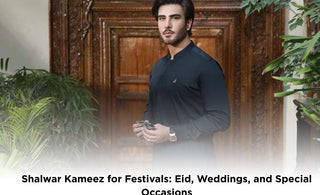
Introduction: A Dress Beyond Ordinary Days
Festivals and celebrations are incomplete without the right attire. In South Asia, the Shalwar Kameez has always been more than clothing—it is tradition. People wear it with pride on special days, making it a symbol of unity and culture.
When Eid arrives or weddings light up the season, the Shalwar Kameez becomes the first choice for both men and women. Its adaptability makes it perfect for prayer, family gatherings, and grand celebrations.
Shalwar Kameez for Men: A Blend of Tradition and Style
The Shalwar Kameez for men is not just a garment but a cultural statement. On festive days, men often choose fine fabrics like cotton, silk, or jamawar. The simplicity of the cut allows creativity in embroidery and colors.
During weddings, the Shalwar Kameez for men often pairs with waistcoats or sherwanis for a royal touch. On Eid, pastel colors or crisp whites add elegance. Its versatility makes it a staple for all occasions.
Eid Celebrations and Shalwar Kameez
Symbol of Unity and Faith
Eid is a celebration of joy, family, and gratitude. The Shalwar Kameez adds beauty to this moment. Wearing it to Eid prayers or family gatherings creates a sense of belonging. For men, a freshly pressed Shalwar Kameez often symbolizes purity and devotion.
Simple Yet Elegant Choices
While some prefer elaborate designs, many men keep it simple with a solid color suit. The Shalwar Kameez for men on Eid often includes a subtle embroidered collar or a tailored fit. This balance of simplicity and elegance is why it never goes out of fashion.
Weddings: Grandeur in Every Stitch
Shalwar Kameez for the Groom
Weddings demand splendor, and the Shalwar Kameez for men rises to the occasion. Grooms often wear heavily embroidered kameez with rich fabrics like jamawar or velvet. Paired with a turban or waistcoat, it creates a regal look.
Guests and Family Styles
Guests also embrace Shalwar Kameez at weddings. From bright colors to intricate embroidery, it reflects festivity. Men may layer it with embroidered waistcoats, while women style theirs with dupattas and jewelry. Together, these choices create a colorful atmosphere.
Other Special Occasions
Cultural and Religious Gatherings
Apart from Eid and weddings, there are many occasions where Shalwar Kameez shines. During religious gatherings, national days, or even family milestones, it stands as the attire of choice. The Shalwar Kameez for men is especially appreciated for its comfort and elegance.
Modern Celebrations
In today’s world, birthdays and parties also see Shalwar Kameez in unique forms. Modern tailoring has made slim-fit styles popular. Adding a jacket or a stylish cut brings a contemporary edge while keeping tradition alive.
Fabrics and Designs that Elevate Festive Looks
Luxurious Fabrics
Fabrics play a vital role in making Shalwar Kameez suitable for festivals. Cotton works well for Eid mornings, while silk and jamawar shine at weddings. The Shalwar Kameez for men often blends fabrics with fine embroidery to balance luxury with comfort.
Creative Embellishments
Embroidery, buttons, and collars add personality to each outfit. On special occasions, men experiment with unique colors like maroon, navy, or deep green. Each detail transforms a simple outfit into a festive statement.
The Timeless Appeal of Shalwar Kameez
The charm of the Shalwar Kameez lies in its timelessness. It connects generations and bridges tradition with modern style. Whether it’s Eid morning or a wedding night, the attire remains relevant and beloved.
For men, the Shalwar Kameez for men continues to symbolize respect, elegance, and pride. For women, it reflects grace and cultural heritage. Together, they ensure this attire remains the heartbeat of festivals and special occasions.
Conclusion:
Festivals bring people together, and clothing adds meaning to these moments. The Shalwar Kameez has remained central to Eid, weddings, and countless other events. It adapts, evolves, yet stays true to its roots.
The Shalwar Kameez for men and women will always be more than just clothing. It is tradition, identity, and a celebration in itself. On every special occasion, it tells a story of culture and pride.

